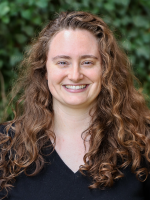This story is part of Michigan Public's series "Mornings in Michigan," which features morning moments from across the state.
For many, a visit to the farmers market is a weekend morning ritual. For those experiencing food insecurity, though, accessing fresh, local fruits and vegetables is difficult and expensive.
Produce prescription programs aim to make it easier.
Food as medicine
On a breezy, beautiful Saturday morning in September, I stopped by my local farmers market in downtown Ypsilanti. I spotted a tomato the size of my head that would absolutely be going home with me, but my first stop was a booth with no fruits or vegetables at all.
It was the booth for Prescription for Health. The program gives participants $100 dollars in tokens to spend at local farmers markets every year. Team member Katey Krohn walked me through the requirements to qualify.


“You have to be insecure for fruits and veggies. You have to be able to fully use the program," Krohn said. "So are you able and willing to go to the farmer's market to actually buy those fruits and vegetables? And then are you at risk or do you have chronic diseases? Those are kind of the three things that we’re looking for.”
Tedi Milgrom directs the Prescription for Health Program. She’s been with the county health department for over a decade and she’s worked on a number of food assistance programs.
“The really great thing about produce prescription programs is the opportunity to provide food as medicine to food insecure individuals," Milgrom said. "Especially at this time when food prices are increasing with inflation.”
Roberta Reed is a community health worker with the program. She also lives in Ypsi.
There were two large binders on the table in front of her, each full of recipes and helpful information.
“A lot of it has storage and packaging of food, vegetables. It tells you about herbs and spices. Another one will give you ways to help you manage your high blood pressure, your diabetes, high cholesterol," Reed said. "So there's a lot of good information in there just to help you navigate, sometimes when your doctor is telling you, 'Hey, take this pill,' and you're like, 'I'm going to eat some fruits and vegetables. Let me see what else I can do.'”
While the program stresses lifestyle changes as a way to manage chronic disease, people who want to join must be referred by a qualified healthcare provider.
The program serves about 450 Washtenaw County residents every year and has booths at several other markets including ones in Chelsea, Ann Arbor, and Pittsfield.
A win-win
Parish Ware uses Prescription for Health. She said she was referred to the program when she first moved to Michigan from Indiana.
“I was pregnant with my daughter at the time, and a program that we were in, one of the nurses that used to call to check on us referred us to this program.”

That was three years ago, and she’s still coming back.
“We love fresh fruits," Ware said. "And we love veggies, some of us more than others…”
She side-eyed her two young sons with her at the market that day.
“I definitely like knowing what's going into my family's bodies.”
Ware enjoys cooking, and her favorite thing to make is a kale soup with carrots and beef.
She said the tokens are easy to use, and the list of vendors who take them is growing.
One of the vendors was Violet Flores with Refugee Garden Initiatives. Her booth had different types of herbs like shiso and Thai basil, and Asian greens like bok choy, tatsoi, and napa cabbage.
“What's really cool about Ypsilanti's market is we don't individually, as vendors, have to sign up for it ," Flores said. "We give it back to the market coordinators at the end of the day and they cash it for us.”
Sheats Farms, a family farm in Milan, had by far the biggest display at the market that day, with everything from peppers to pumpkins to plums. David Sheats is also a fan of the program.

“It brings in a lot more money to the market and it helps everyone get fresh produce,” he said.
Last year, Prescription for Health participants spent more than $30,000 at farmers markets in Washtenaw County. Over a third of that was spent in Ypsi.
Seeds for the future
Director Tedi Milgrom said funding sources for the program have changed over the years. Past supporters have included the Kresge Foundation and Trinity Health.
“Last year we were able to secure county general fund funding for the program for five years," Milgrom said. "So this is the most stable funding that we've had. And at this time when, unfortunately, we are seeing cuts to public health programs and food programs. We are very happy to have steady, secure funding.”
Milgrom said food insecurity is often a long term problem. Sixty percent of participants re-enroll every year.
“There is always more of a need than the participants we're able to serve," she said. "And those we are able to serve, you know, it's just a little something extra to help them, but definitely often doesn't meet all of their food insecurity needs.”
Claire Austin manages the Ypsilanti Market. Back in her office, she said many participants come back to the market even after they’ve run out of tokens for the season, because it’s part of their routine.
“I think farmer's markets kind of have this reputation of being like for the bougie and the people who can afford like a $10 tomato," Austin said. "But that's honestly totally not the vibe.”
Prescription for Health began in Washtenaw County in 2008. Since then, other produce prescription programs have taken root in different parts of the state.







